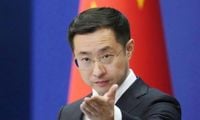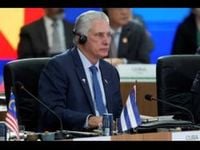On July 15, 2025, the United States government announced a sweeping new set of sanctions targeting Cuban President Miguel Díaz-Canel and several high-ranking officials, marking a significant escalation in Washington's longstanding pressure campaign against Havana. The sanctions come amid growing concerns over human rights abuses, the repression of political dissent, and Cuba's pivotal role in regional geopolitics.
The U.S. State Department, led by Cuban-American Secretary of State Marco Rubio, declared that these sanctions are a direct response to "gross violations of human rights" committed by the Cuban regime, particularly during the brutal crackdown on the July 2021 protests. Those protests, which erupted on July 11 and 12, 2021, were the largest in decades, driven by economic hardship and political frustration, and were met with severe repression.
Rubio announced on social media platform X that visa restrictions would be imposed not only on President Díaz-Canel but also on Defense Minister Álvaro López Miera, Interior Minister Lázaro Alberto Álvarez Casas, and numerous Cuban judicial and prison officials implicated in the unjust detention and torture of protesters. The sanctions extend to their immediate family members as well.
In addition to targeting individuals, the U.S. government expanded its Cuba Restricted List and Cuba Prohibited Accommodations List to include 11 properties linked to the Cuban regime's business arm, GAESA (Business Administration Group), a state-owned company controlled by the Revolutionary Armed Forces. Among these properties is the recently opened 42-story Torre K Hotel in Havana, one of the island's most ambitious tourism projects. This move aims to prevent U.S. funds from reaching the Cuban government by restricting American citizens from staying at these regime-affiliated accommodations.
The sanctions are part of a broader strategy to undercut Cuba's tourism industry, a crucial source of foreign currency that supports social programs including food subsidies, health care, and education. By tightening visa restrictions and discouraging tourism, the U.S. hopes to weaken the Cuban government's financial base.
Florida's congressional delegation, deeply connected to the Cuban-American community, has strongly supported these measures. Rep. Carlos Giménez, a Miami-Dade Republican and the only sitting member of Congress born in Cuba, emphasized the need for solidarity with the Cuban people, stating, "America must stand with the freedom-loving Cuban people against the brutal regime that oppresses them." Similarly, Sen. Rick Scott warned the Castro-Díaz Canel regime that "violence against peaceful political protesters will have consequences." Coral Gables Republican Rep. María Elvira Salazar highlighted the dire situation of political prisoners, notably José Daniel Ferrer, Executive Secretary of the opposition group Unión Patriótica de Cuba, who reportedly suffered seven beatings over 14 days in prison. Salazar urged the U.S. to intervene, saying, "His life is in danger. He cannot be used as a pawn for negotiations; liberty must come without conditions or compromise." Democratic Rep. Debbie Wasserman Schultz also called for action on behalf of imprisoned artists Maykel "Osorbo" Castillo Pérez and Luis Manuel Otero Alcántara, who inspired the Patria y Vida protests.
Rep. Mario Díaz-Balart, a Republican from Hialeah, encouraged European involvement in addressing Cuba’s human rights violations. The European Union recently passed a resolution condemning Cuba for its support of Russia’s invasion of Ukraine, a move Díaz-Balart praised as exposing the regime’s continuous pattern of abuses and its threat to global security.
The Cuban government swiftly condemned the sanctions. Cuban President Díaz-Canel accused the U.S. of targeting Cuba’s "true independence," asserting, "What bothers the U.S. about Cuba is its true independence: the fact that transnational corporations don’t rule here. We have free health and education, and we don’t ask permission to condemn Israeli and American crimes against the Palestinian people." The Cuban Foreign Ministry’s deputy director, Johana Tablada, denounced Secretary Rubio as a "defender of genocide, prisons and mass deportations."
China, a key ally of Cuba, also weighed in. On July 15, 2025, Chinese Foreign Ministry spokesperson Lin Jian condemned the U.S. sanctions as unilateral interference, urging Washington to lift its long-standing blockade and sanctions against Cuba. Lin called on the U.S. to remove Cuba from the list of state sponsors of terrorism and criticized America’s own human rights record, citing Guantanamo Bay and global conduct.
The timing of the sanctions coincided with other moves by the Trump administration to intensify pressure on Cuba, including mass layoffs at the State Department and investigations into imports affecting U.S. supply chains. The administration also announced new sanctions specifically targeting Cuba’s tourism sector, aiming to choke off a vital revenue stream for the island’s government.
These developments unfold against the backdrop of broader U.S. policy shifts. The Trump administration has reinforced a hardline stance toward Cuba, reversing softer approaches from previous administrations. The National Security Presidential Memorandum signed on June 30, 2025, underscores this posture, emphasizing American resolve to confront regimes deemed illegitimate.
Beyond Cuba, Florida’s congressional delegation continues to play a prominent role in national security and defense matters. Senator Rick Scott, chair of the Senate Armed Services Seapower Subcommittee, secured nearly $950 million in military construction funding for Florida, highlighting the state’s strategic importance with over 20 military installations and three combatant commands. Scott praised efforts to exclude adversaries like Communist China from U.S. supply chains and to maintain readiness across all domains.
Meanwhile, Senator Ashley Moody celebrated the passage of the Secure U.S. Leadership in Space Act, which grants tax-exempt status to spaceports, leveling the playing field with airports and seaports. This legislation aims to bolster U.S. competitiveness in the space industry, particularly against China, and energizes Florida’s Space Coast as a hub of innovation and economic growth.
On a different note, Florida Representatives have been active in addressing domestic issues. Rep. Maxwell Frost reintroduced legislation to eliminate hidden rental fees and discriminatory credit screenings, aiming to ease housing burdens for renters. Conversely, Rep. Cory Mills faces eviction proceedings over unpaid rent on his Washington apartment, highlighting the personal challenges some lawmakers confront.
In immigration policy, Rep. Greg Steube and Senator Ashley Moody championed the STOP GAPS Act to reform the care and placement of unaccompanied migrant children, emphasizing the need for proper vetting and safe custody arrangements.
Florida’s ports also received attention. Rep. Laurel Lee introduced the CBP SPACE Act to ensure Customs and Border Protection’s equipment costs at seaports are fairly allocated, protecting local economies and jobs.
Finally, the Cuban sanctions reflect a complex geopolitical chessboard involving human rights, regional security, and international alliances. The U.S. aims to support Cuban dissidents and pressure the regime, while Cuba and its allies resist what they see as unjust interference. As the sanctions take effect, the world watches closely to see whether these measures will prompt change or deepen an already fraught standoff.


